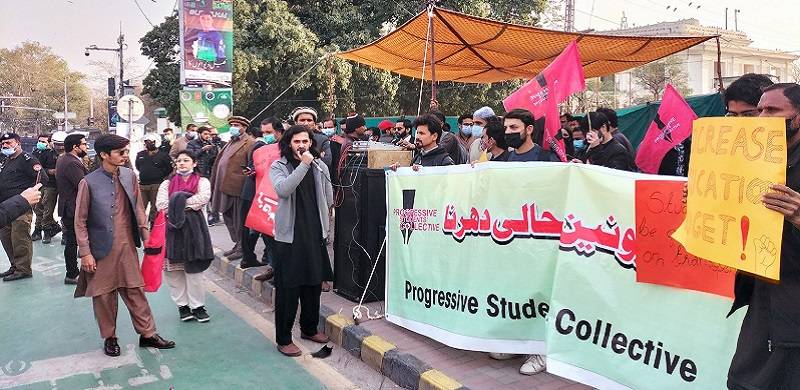
The restoration of student unions in Sindh has been lauded as a 'historic move'. But students across the country while welcoming the development have expressed scepticism about implementation of the decision.
The Sindh Assembly on Friday passed a bill to restore student unions at educational institutions across the province. For the first time in nearly forty years, student unions will be formed at every private and government educational institution in Sindh with elections held every year. However, membership will be capped at 11 students, and further rules will be decided in two months.
Progressive Students Federation (PRSF) Karachi President Waqas Aalam told Geo.tv that until the Sindh government published an election schedule, the group would consider the move as a 'political tactic,' adding that student organizations had not been consulted prior to passing the bill.
"PRSF has reservations about the language of the bill, particularly about its vagueness and obscurity. Its laws do not explain campus laws that are going to apply to the union," he said.
Slightly more hopeful, Islami Jamiat-e-Talaba (IJT) spokesperson Engineer Usama hoped the government would deliver on its commitment, saying, "With this step, we hope that student unions will be revived in their true spirits and the educational institutions will draft the rules and regulations within the mandated time."
Peoples Students Federation (PSF) and All Pakistan Muttahida Students Organisations' (APMSO) both expressed optimism that the bill would finally ensure students can practice their rights on school campuses.
Until they were banned by General Zia ul Haq in 1984, student unions played a significant and lively role in Pakistani politics, including during the country's independence. Notably, it was student power that eventually forced the ouster of Pakistan's first military dictator General Ayub Khan.
The Sindh Assembly on Friday passed a bill to restore student unions at educational institutions across the province. For the first time in nearly forty years, student unions will be formed at every private and government educational institution in Sindh with elections held every year. However, membership will be capped at 11 students, and further rules will be decided in two months.
Progressive Students Federation (PRSF) Karachi President Waqas Aalam told Geo.tv that until the Sindh government published an election schedule, the group would consider the move as a 'political tactic,' adding that student organizations had not been consulted prior to passing the bill.
"PRSF has reservations about the language of the bill, particularly about its vagueness and obscurity. Its laws do not explain campus laws that are going to apply to the union," he said.
Slightly more hopeful, Islami Jamiat-e-Talaba (IJT) spokesperson Engineer Usama hoped the government would deliver on its commitment, saying, "With this step, we hope that student unions will be revived in their true spirits and the educational institutions will draft the rules and regulations within the mandated time."
Peoples Students Federation (PSF) and All Pakistan Muttahida Students Organisations' (APMSO) both expressed optimism that the bill would finally ensure students can practice their rights on school campuses.
"Now that we have representation in the anti-harassment committees, we can make sure that our voice is heard and no injustice will be done with students," General-Secretary of the Peoples Students Federation (PSF) Talal Chandio said.
Until they were banned by General Zia ul Haq in 1984, student unions played a significant and lively role in Pakistani politics, including during the country's independence. Notably, it was student power that eventually forced the ouster of Pakistan's first military dictator General Ayub Khan.

